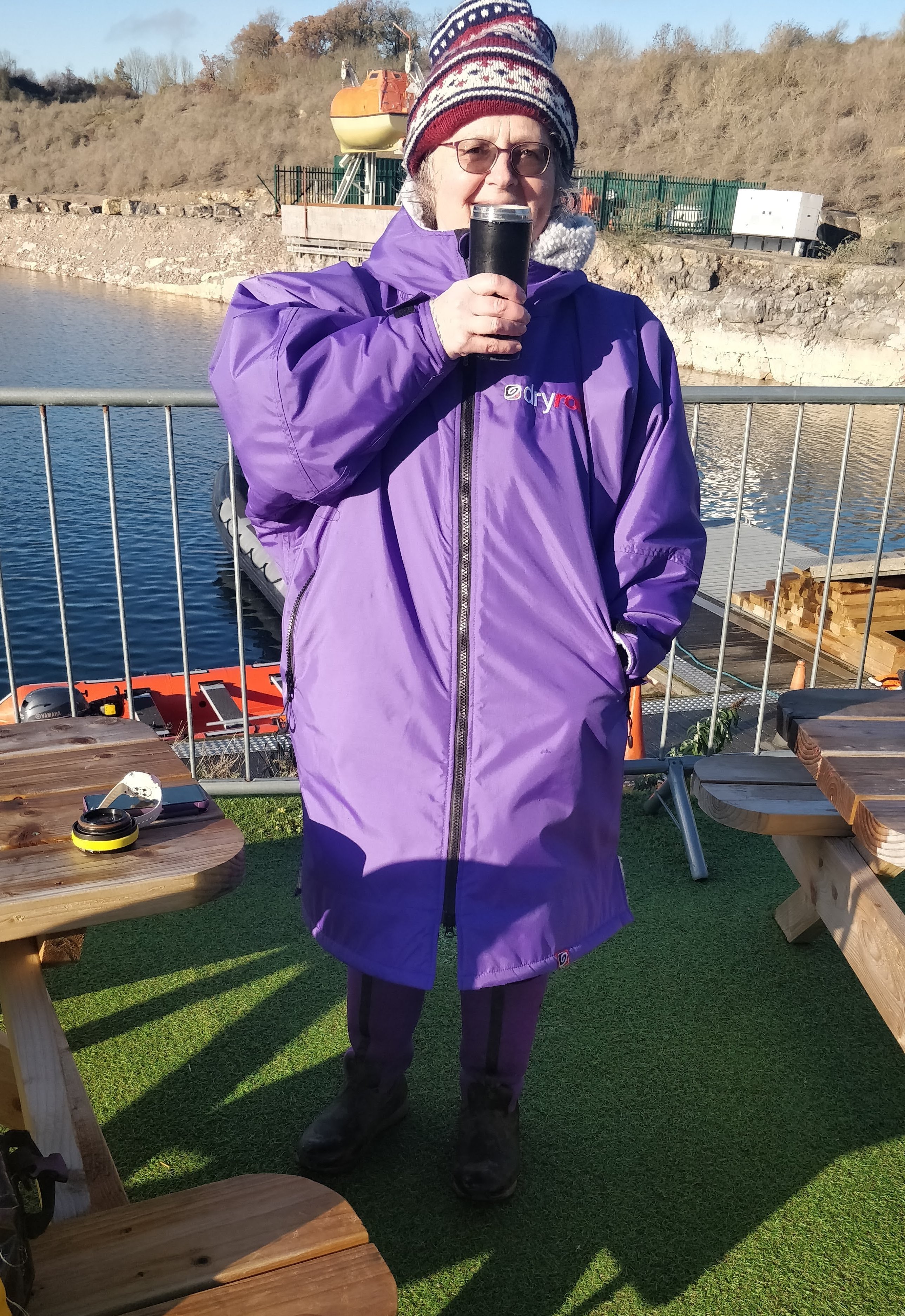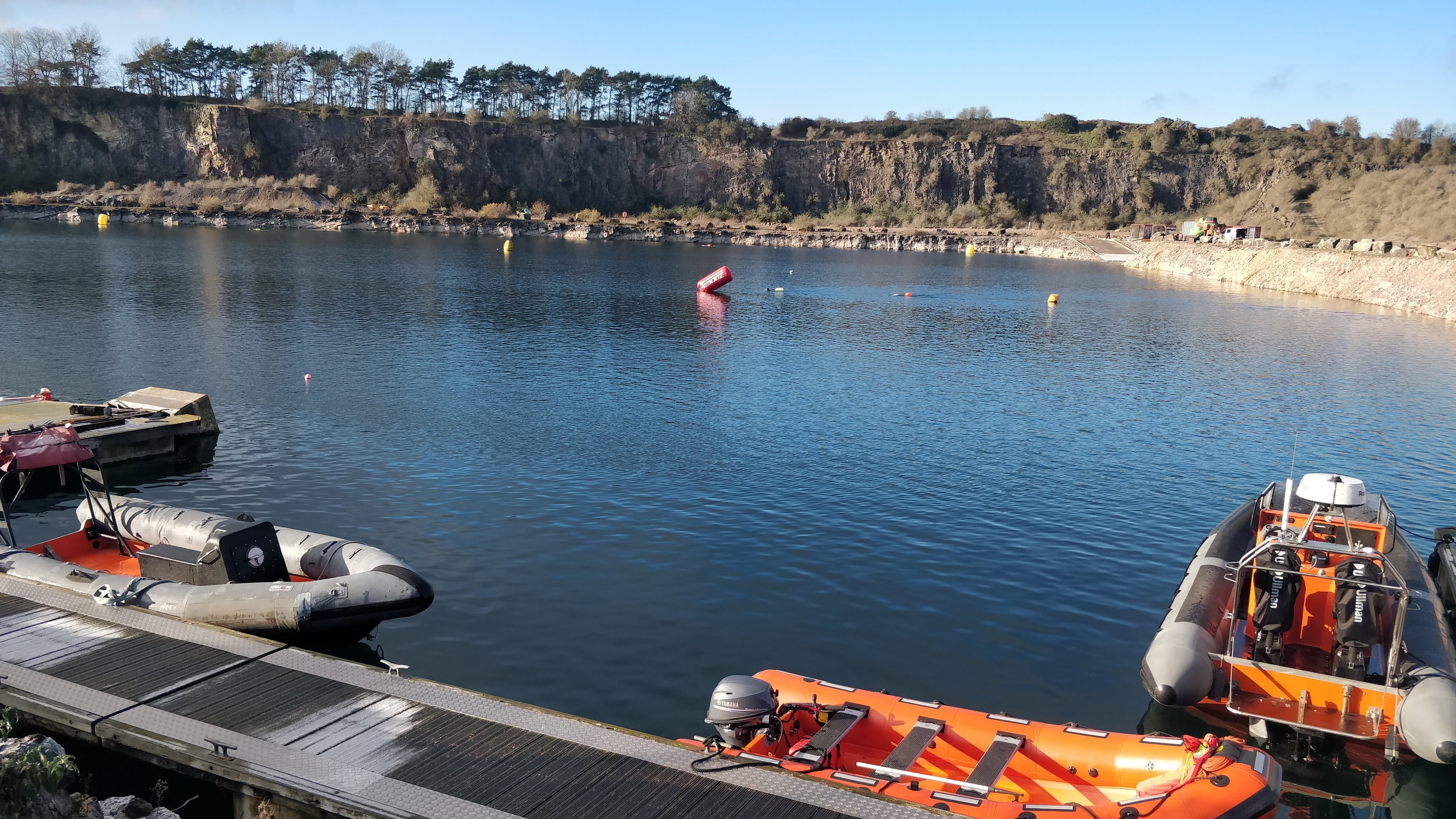Can cold water swimming help MS symptoms?
“When it’s cold I find it much easier to do the exercise and it has a better impact on me for the rest of the day. When I swim it’s a meditation, nothing else matters. I’m concentrating on my breathing, on my arms. This and the community, being outdoors and the blues and greens of the environment are so serene. I don’t look like I’ve got MS when I go swimming. I don’t
have a stick, I’m not slower, I’m not about to fall over”, says Amanda.
Having lived with relapsing-remitting MS for a number of years, the condition worsened just before the Covid-19 pandemic began in 2019, and Amanda lost some use in her right leg and arm:
“When I turned 60, I thought I’m fed up with being a patient! I’m going to change this. So, for my birthday, I’m going to do a triathlon. I was running when my leg went, and all of a sudden, I couldn’t get my leg over my bike, and I couldn’t run. I couldn’t walk for more than half a kilometre”.
Following the fall, Amanda was diagnosed with secondary progressive MS. Although this was a difficult time for Amanda, and even though she could no longer do a triathlonthe training had prepared her for getting into cold water.
“I started doing open water swimming, which was a little bit scary, but I began in the pool and then started going to Clevedon in the summer. Then I met people [as the weather began to cool] who were still swimming in swimming costumes - I was in a wetsuit, she adds.”
Over time Amanda kept getting into the water, even as the seasons changed to winter.
“I started to swim outdoors more. As we couldn’t get into pools [due to Covid-19 restrictions], we went to Lake Bala in Wales when we were allowed to, and I decided to see if I could swim across the lake!”, says Amanda.
Explaining her bravery, Amanda adds, “My husband was canoeing alongside me just in case. I calmed my breathing down and didn’t rush, so it became very meditative for me - I couldn’t fall over in the water. I was ‘normal’ in the water. The water supports you if you let it. I was hooked, if cold!”
What benefits does Amanda feel this has brought her?
 “When I first lost the use of my arm, I totally lost it. I couldn’t put my socks on or turn a key - although in relapsing-remitting you get a lot of that back, but not totally. Whereas now I have no feeling in my arm but I can still do things. The feedback is difficult because I can’t feel a pen in my hand, or I can’t feel my earrings.”
“When I first lost the use of my arm, I totally lost it. I couldn’t put my socks on or turn a key - although in relapsing-remitting you get a lot of that back, but not totally. Whereas now I have no feeling in my arm but I can still do things. The feedback is difficult because I can’t feel a pen in my hand, or I can’t feel my earrings.”
“Does the cold water help with MS? I have no idea. However, I don’t look like I’ve got MS when I go swimming. I don’t have a stick, I’m not slower, I’m not about to fall over.”
Amanda also says that although she personally doesn’t feel a ‘high’ from the exercise, she does get the ‘smug factor’: “It’s the fact that I can do a sport that is low impact, and I can’t do anything to damage myself! I love being out in the fresh air, and I don’t need adaptations to do this, so I’m not scared of losing my ability to do something”.
In addition, Amanda points to her sensitivity to heat as another reason why cold-water swimming works for her. As a result, Amanda spent a lot of time in the water during this year’s summer heat waves to keep cool.
“When it’s cold I find it much easier to do the exercise and it has a better impact on me for the rest of the day. I have issues with feeling fatigued and the mobility in my l eg worsening if I get hot, but I certainly never get hot swimming. I’m absolutely convinced it helps with my mental health and how I cope with my MS.
MS fatigue
Amanda, like many people with MS, experiences fatigue that interferes with her day-to-day activity. She combined with pacing her energy and taking rest breaks, that cold water swimming helps keep her energy levels up and prevents her symptoms from worsening throughout the day:
“It’s difficult to tell if things are getting better or if I’m just better at coping with it [MS], but I think it has a knock-on effect on what I can do with the rest of the day. I’m always quite good in the morning and that’s when I go swimming… I personally think that’s because I’m then cold. If I do a class, it’s usually inside and I then get warm”, a common trigger.
“Being sociable and in a crowd is tiring, but I do the swimming solo. So, I’m not chatting, but there are people around after I get out of the water. If I’m tired I can also just float.”
What do you need to get started?
If you are interested in trying out cold-water swimming, then please follow some general guidance. MS Research would also urge anyone living with MS to also seek advice from their MS practitioner or Nurse.
Take account of your personal health before stepping into the water. Never jump straight into the water, especially as a beginner. This could lead to shock and cardiac arrest. Contact your GP before commencing cold water swimming if you have any health concerns.
The length of time a person can stay in the water will depend on their individual circumstances on that day. For instance, how much they have eaten, how much sleep they have had, how fit/ experienced they are and how cold the air and water temperatures are. Gradually build up the length of time that you are in the water.
Never jump straight in, especially as a beginner. This can lead to shock, cardiac arrest and death. It is inadvisable to begin cold-water swimming in winter when water temperatures and cold weather are their harshest. Beginners are also advised to wear wetsuits. Amanda swims in a wetsuit and wears a hat, and neoprene boots and gloves to keep her extremities warm. When the weather and water are warmer she may dip in with just a swimsuit.
Do join a cold-water swimming group to ensure you are not alone, which is best for safety and companionship. The Blue-tits and Blue-bells are two such groups that meet nationwide, or you can search for a local open swimming community close to you. Reducing the distance you travel or sharing lifts will give you more energy for getting into the water.


